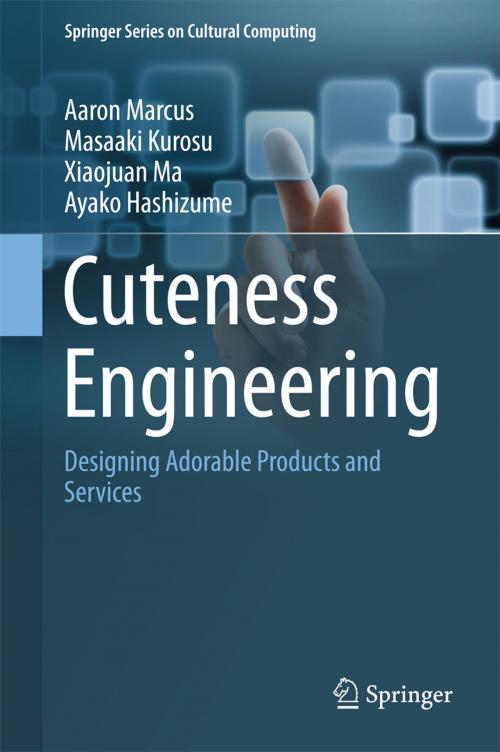Cuteness Engineering
Designing Adorable Products and Services
Nonfiction, Computers, Advanced Computing, Programming, User Interfaces, Application Software, Multimedia, General Computing| Author: | Ayako Hashizume, Aaron Marcus, Masaaki Kurosu, Xiaojuan Ma | ISBN: | 9783319619613 |
| Publisher: | Springer International Publishing | Publication: | October 30, 2017 |
| Imprint: | Springer | Language: | English |
| Author: | Ayako Hashizume, Aaron Marcus, Masaaki Kurosu, Xiaojuan Ma |
| ISBN: | 9783319619613 |
| Publisher: | Springer International Publishing |
| Publication: | October 30, 2017 |
| Imprint: | Springer |
| Language: | English |
This state of the art monographpresents a unique introduction to thinking about cuteness and its incorporation into modern, especially computer-based, products and services. Cuteness is defined and explored in relation to user-centered design concepts and methods, in addition to considering the history of cuteness and cuteness in other cultures, especially in relation to eastern Asia.
The authors provide detailed analyses and histories of cuteness in Japan and in China, the rise of Kawaii and Moe cultural artifacts, and their relation to social, psychological, and design issues. They also attempt an initial taxonomy of cuteness. Finally, detailed interviews with leading designers of cute products and services, such as Hello Kitty, provide an understanding of the philosophy and decision-making process of designers of cuteness.
Cuteness Engineering: Designing Adorable Products and Services will be of interest and use to a wide range of professionals, researchers, academics, and students who are interested in exploring the world of cuteness in fresh new ways and gaining insights useful for their work and studies.
This state of the art monographpresents a unique introduction to thinking about cuteness and its incorporation into modern, especially computer-based, products and services. Cuteness is defined and explored in relation to user-centered design concepts and methods, in addition to considering the history of cuteness and cuteness in other cultures, especially in relation to eastern Asia.
The authors provide detailed analyses and histories of cuteness in Japan and in China, the rise of Kawaii and Moe cultural artifacts, and their relation to social, psychological, and design issues. They also attempt an initial taxonomy of cuteness. Finally, detailed interviews with leading designers of cute products and services, such as Hello Kitty, provide an understanding of the philosophy and decision-making process of designers of cuteness.
Cuteness Engineering: Designing Adorable Products and Services will be of interest and use to a wide range of professionals, researchers, academics, and students who are interested in exploring the world of cuteness in fresh new ways and gaining insights useful for their work and studies.















